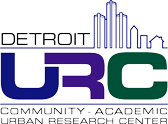Small Planning Grants Awarded to Community-Academic Partners
Four community-academic partnerships have been selected to receive grants of up to $5,000 each from the Detroit Urban Research Center (Detroit URC). These grants will support research that improves the health and quality of life of Detroit residents. This marks the ninth round of the small planning grant program. We are pleased to acknowledge the support provided this year by the University of Michigan Vice Provost for Global Engagement and Interdisciplinary Academic Affairs and the Michigan Institute for Clinical & Health Research (MICHR) Communities Engagement Program.
Funded partnerships are:
Enhancing Purpose-in-Life among At-Risk Latino Adolescents (EARL)
For decades, Detroit has been a city distressed by poverty, corruption, gang activities, family and community violence, and racial tensions. Issues of hopelessness and a lack of purpose in life combine with traumatic experiences to limit productive engagement by Latino youth in their communities. Without a robust sense of purpose in life, Latino youth in distressed settings such as Detroit are likely to remain disconnected in society.
The goal of Project EARL is to identify a mechanism by which a sense of purpose in life can be enhanced among at-risk Latino adolescents enrolled in one or more of Detroit Hispanic Development Corporation’s (DHDC) programs (Joven Noble, Urban Academy, Robotics Engineering, and Environmental Engagement, Advocacy and Leadership). The objective is to conduct an experimental study that examines the effects of the Myers Briggs Type Indicator (MBTI) assessment and related Career Report on purpose in life among DHDC program participants. The MBTI Career Report applies a person’s reported type from the MBTI assessment to relevant job families and occupations identified through previous research. The MBTI Career Report will not only help Latino youth understand themselves better by learning about their perception and judgment preferences, but also how those preferences are related to their occupational interests.
Angela Reyes
Executive Director
Detroit Hispanic Development Corporation
Ruben Martinez
Director, Julian Samora Research Institute
Michigan State University
Partnership for Transgender Health and Resilience in Detroit
While the visibility of Transgender and Gender Nonconforming (TGNC) communities has increased in recent years, they remain one of the most vulnerable populations in the United States and Michigan.
In order to develop and implement culturally appropriate public health interventions for TGNC youth and young adults, researchers must work in collaboration with TGNC individuals and community-based organizations (CBOs) that serve this population. This community-academic partnership between Trans Sistas of Color Project-Detroit (TSoCP) and researchers at the University of Michigan School of Public Health (UMSPH) furthers this area of research. This community-academic partnership will allow for community-engaged research that prioritizes areas of unmet need among TGNC young people in Detroit, while building the research capacity of a grassroots CBO that serves TGNC communities in Detroit.
Bré Anne Campbell
Executive Director
Trans Sistas of Color Project
Gary W. Harper
Professor, Health Behavior and Health Education
University of Michigan School of Public Health
Partnership Formation in Community-Engaged Work: The Detroit Food Academy
From cooking delicious healthy meals for friends and family, to facilitating complex conversations with community, to developing artisanal food projects from scratch to market, students of the Detroit Food Academy (DFA) learn by transforming their ideas into reality. By developing food-based solutions in and for their communities, students learn how to identify problems, implement solutions, and grow as holistic leaders who are healthy, connected, and powerful to affect change within and beyond the local food system.
A recently-formed partnership with the University of Michigan School of Social Work will examine and enhance the impact of the DFA through a strategic process of analysis and evaluation. The goal of this partnership is to collaboratively identify the organization’s most pressing technical challenges and develop processes that will not only enhance the organization’s day-today productivity but also prepare them for future growth. Together, the team will evaluate current capacities, conduct preliminary analyses and develop support systems to improve future decision-making processes.
Jen Rusciano
Executive Director
Detroit Food Academy
Emily Nicklett
Associate Professor of Social Work
University of Michigan
Exploring Research Partnership Opportunities: Youth Development Programming Impact on Neighborhood Social Conditions
Youth need access to safe environments, trusting adults, and opportunities for learning and support in order for to succeed in achieving positive and productive futures. Developing a new partnership, Urban Neighborhood Initiatives (UNI), a nonprofit community development organization providing youth development programming, will work with the University of Michigan’s Youth Policy Lab to measure improvements in the social condition of the Springwells neighborhood of Southwest Detroit.
In order to affect positive change, UNI has invested heavily in a complex network of groups supporting young people in the Springwells neighborhood, including parents, teachers, schools, neighborhood block clubs, and nonprofits. In partnering with the Youth Policy Lab, new work will explore the ways to measure the impact of youth programs on improving the social conditions of the neighborhood as a whole. The partnership will determine areas of opportunity for collaboration, reach out to other potential partners to join the group, and seek clear areas for collaborative research.
Christine Bell
Executive Director
Urban Neighborhood Initiatives
Robin Jacob
Co-Director
University of Michigan Youth Policy Lab
The Detroit URC is a partnership of representatives from the Detroit Health Department, Henry Ford Health System, nine community-based organizations (CBOs) in Detroit, and faculty members from the U-M Schools of Public Health, Social Work, and Nursing. The CBOs are: Communities In Schools; the Community Health and Social Services Center, Inc.; Detroit Hispanic Development Corporation; Detroiters Working for Environmental Justice; Eastside Community Network; Friends of Parkside; Institute for Population Health; Latino Family Services; and Neighborhood Service Organization.



